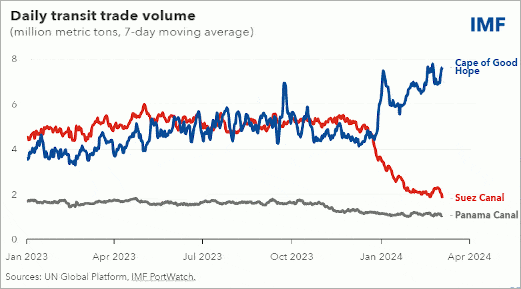
In the first two months of 2024, due to the crisis in the Red Sea
where there are attacks on maritime traffic in the region, the
ship transits in the Suez Canal decreased by -50% compared to the
compared to the same period last year, while it increased by
+74% commercial maritime traffic transiting around the
Cape of Good Hope. These variations have been highlighted
by the International Monetary Fund (IMF) and are data-driven
provided by the PortWatch platform created by the International Monetary Fund
International in collaboration with the University of Oxford
monitoring disruptions and obstacles to maritime traffic.
The IMF has pointed out that the drastic drop in transits in the
Egyptian canal adds up to the effect of traffic restrictions
crossing the Panama Canal due to the serious
drought that characterizes the region. These are two arteries
maritime - underlined the IMF - through which normally
about 15% and about 5% of the volumes of
world maritime trade.
In addition, the data reveal that in the first two months of this year there was a
There was a decrease of -6.7% in the number of ship calls at the
70 ports monitored in sub-Saharan Africa and that a downturn
-5.3% was recorded in relation to stopovers at
ports in the European Union, the Middle East and Central Asia,
decreases, the IMF specified, which probably reflect the
Transitory effects of longer shipping times
caused by these crises, effects which, if they persist, were to persist
could temporarily hamper some supply chains in the
nations in the affected regions and cause upward pressure
partially caused by rising
expedition.
